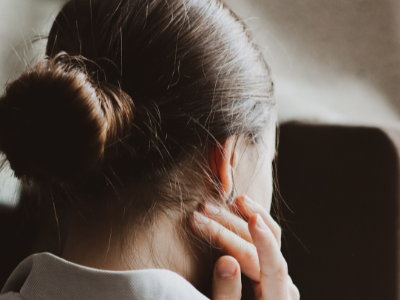Sleep advice from a dentist? Yes, you read correctly! The link between our oral
health and general wellbeing is undeniable, with our dental hygiene influenced by
everything from gut health to sleep habits. Similarly, when our oral health is out of
whack, we wind up with major issues across other areas of our body.
So we turned to the dental experts at Sydney Holistic Dental Centre (SHDC),
in particular Dr Lewis Ehrlich, who takes an all-encompassing approach to both
dental and general health. Considering all the ways our bodies are interconnected,
it’s not that surprising that a dentist would have some hot tips on how to get
better sleep - with any luck, these ideas will have you smiling in no time!
Mouth breathing
Dr Lewis has a saying when it comes to breath: “Mouths are for eating, noses
are for breathing.” Our nose is designed to filter, warm and humidify the air we
breathe, whereas mouth breathing typically causes poor posture, headaches
and migraines, and lower blood oxygen levels, which leave us with drastic drops
in energy.
But where mouth breathing is most harmful is in our sleep. You may be breathing
through your mouth if you wake up tired, have dry or cracked lips, experience
disrupted sleep, or you snore or grind your teeth.
If you’re mouth breathing in your sleep, Dr Lewis suggests ‘training’ yourself to
breathe through your nose. Using gentle micropore tape, place a strip over your
lips before bed, folding the edges over for easy removal. Over the first few nights,
you might find yourself pulling the tape off mid-sleep, but with time and
persistence, the body adapts, and soon you’ll be breathing deeply and calmly
through your nose all night long.
No need to jump straight in the deep end, however; Dr Lewis advises wearing the
tape for 15 minutes before bed so you get used to the feeling. If this practice run
proves your nose to be too blocked up, then you may need to consult an ENT
specialist to address your breathing habits.
Clenching & grinding

Whether it’s stress or anxiety, dysfunctional breathing, sleep apnoea, or poor
nutrition, teeth clenching and grinding can be caused by any number of health
issues. Deficiencies or the use of stimulants like caffeine, alcohol or some
prescription drugs can also lead to teeth grinding or clenching.
But what’s worse is that even more problems often arise as a result of teeth
grinding - things like headaches, ear pain, strain or tension in the jaw, cracked
or chipped tooth enamel, and sensitive teeth.
If you suspect you might be a nocturnal teeth grinder, you can tee up a visit with
your dentist and discuss getting what’s called an occlusal splint. These
custom-fitted night guards not only protect your teeth from wear, but relieve a lot
of the pressure and pain that grinding causes. Even better, treating this common
problem can improve energy flow throughout the body, which is especially helpful
during sleep to improve airways and breathing for a refreshing night’s sleep.
Sleep positions

Something that impacts both your general and oral health is your sleeping
position. And when we spend upwards of 7 hours a day sleeping, the
consequences can play a big role in our health journey.
Sleeping on your stomach, for example, is considered a problem position.
It causes twisting in the cervical spine and pelvis, and can exacerbate chronic
headaches or neck aches in those who experience them. It also compromises
your ability to breathe properly while asleep, and we know that our breathing is
integral to getting proper rest.
Side or back sleeping, on the other hand, is ideal for muscles in the head, neck,
and jaw, as well as doing wonders for the airways. Dr Lewis recommends side
sleeping with a contoured natural pillow to support the neck and the use of an
additional pillow in between the legs to prevent twisting onto the stomach and
straining both pelvis and neck. Bonus points for using an organic natural latex
pillow, which is hypoallergenic and makes functional breathing even easier!
But don’t fret - retraining your body’s natural sleeping position is not as hard as
you might think. With the right supports (like organic bedding and contoured
pillows), and a bit of time and persistence, this trick is an effective first step in
dramatically improving your sleep.
Your bedroom is your temple

As an advocate for improving holistic health, Dr Lewis has a number of lifestyle
shifts that can make a big difference to your sleep quality. Most of them lead back
to the very room you sleep in, and how it’s designed to improve your rest.
While we know we should cut back on screens at night, Dr Lewis goes as far as to
insist all electronics be removed from your bedroom. That means charging your
phone in another room, getting rid of the TV and laptop in the bedroom, and
removing any harsh lighting that might affect your mood.
As Dr Lewis says, “The light from electronics ‘tricks’ your brain into thinking it is
daytime and instead of producing melatonin (your body’s sleep hormone),
it produces cortisol (your body’s stress hormone).”
And while we’re talking about bringing the best vibes to your bedroom, don’t
forget about what you’re sleeping on! Nothing says ‘sacred’ like quality bedroom
furniture, a healthy organic mattress, and low tox bedding accessories.
Be holistic with your health
If we’ve learned anything from Dr Lewis and the SHDC team, it’s that our health is
all connected - whether it’s oral, mental, gut, or otherwise! What affects your body
and mind can impact your dental health, and in turn, create more problems
elsewhere in the body.
Prioritise your breathing, your sleep quality, and pay attention to the problems that
interrupt a good night’s sleep. By treating the cause, not just the symptom,
you’ll find your health improves all around, and your sleep naturally follows.




